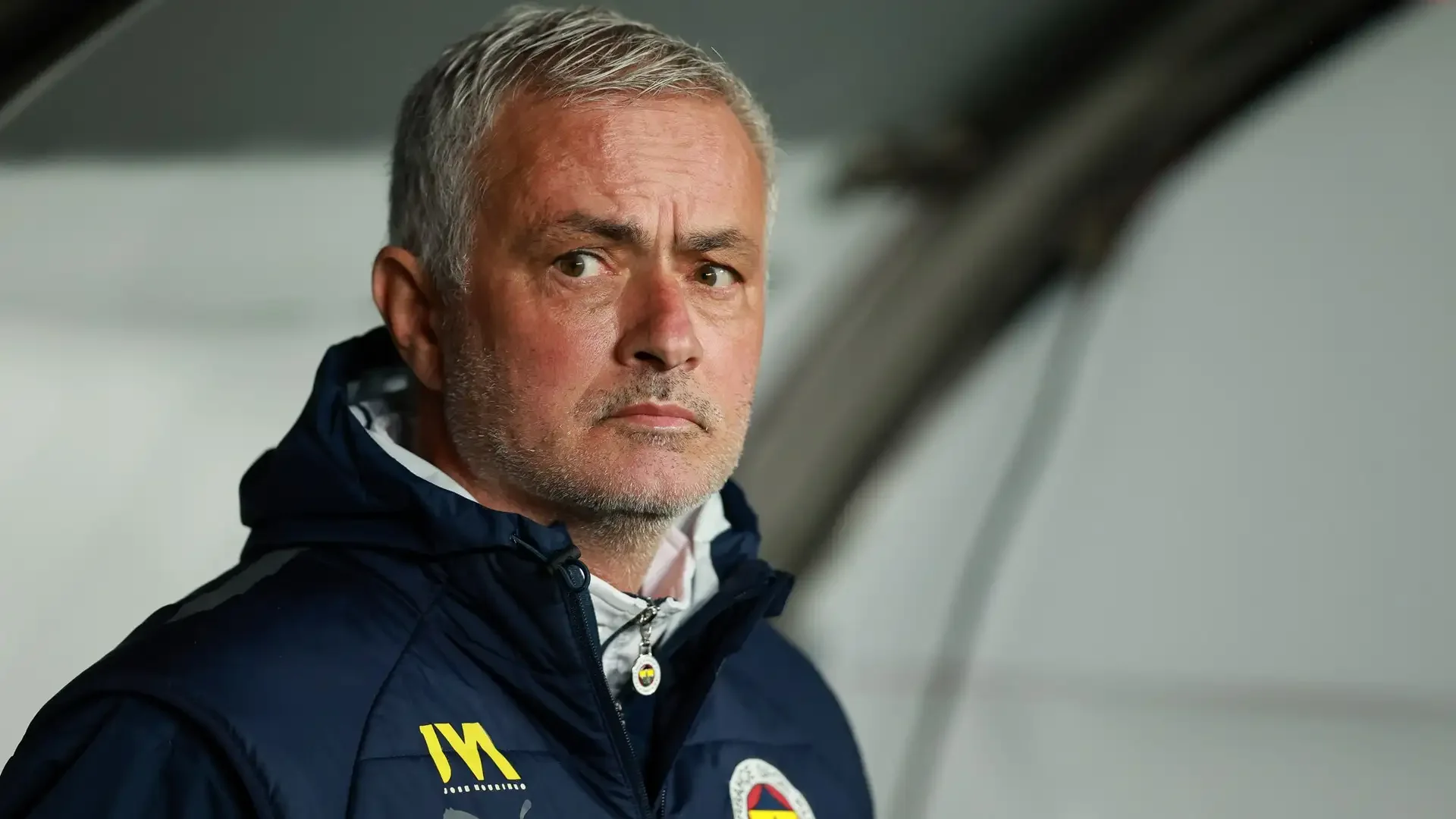José Mourinho: The Humble Playing Career Before the Managerial Greatness
The story of José Mourinho started on a less well-lit stage: the humble fields of Portuguese football, before the world witnessed the spectacle of tactical masterclasses and memorable touchline moments. Although his management era frequently overshadows this prologue, it is an essential part of comprehending the man who would reshape modern football. The foundation for Mourinho’s analytical skills was established by his playing career, which was a tapestry weaved with perseverance rather than star-studded laurels.
Despite being out of the spotlight, his trip was full of hands-on learning opportunities. He grasped the spirit of the game from a player’s point of view by navigating the subtleties of team dynamics and the practicalities of on-field strategy. The strategic mentality that would eventually demolish and rebuild footballing paradigms was developed during this formative time, which was characterized by an unrelenting quest for knowledge.
This is the setting in which his later management genius becomes more poignant. It was a logical progression from a player, engrossed in the game’s complex mechanics, to a manager, planning its epic plots. This formative stage, marked by modest beginnings, emphasizes the idea that genuine excellence frequently results from a deep, grassroots mastery of the trade.
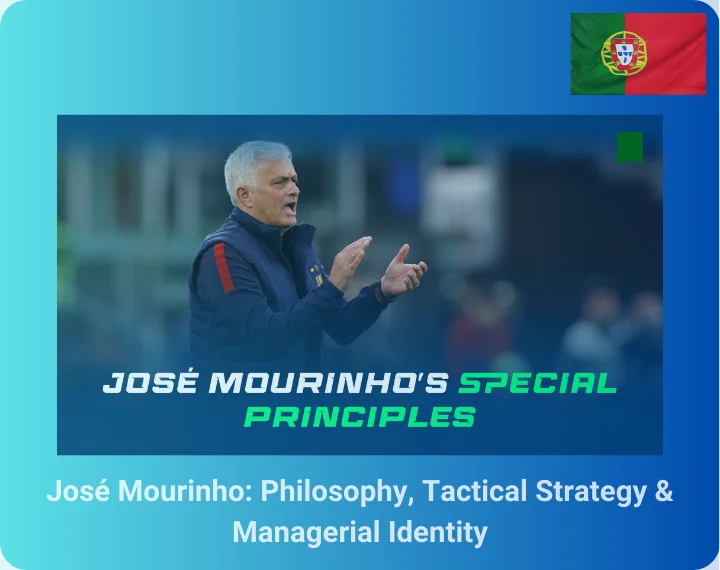
Early Life and Introduction to Football
José Mourinho, a man known for his tactical inventiveness and managerial prowess, is frequently portrayed through his remarkable coaching career. However, one has go back to the early days of his football involvement in order to fully understand the depth of his strategic thinking. His early years, spent immersed in the grassroots aspects of the sport, served as a rich foundation for his subsequent intellectual development.
Instead of being a display of prodigal skill, Mourinho’s debut to football was a slow and steady immersion in its complex fabric. Being up in a football-focused household, he observed and played the game to learn its subtleties. He developed his grasp of the sport’s core ideas at this time, which was marked by a practical involvement with it.
Despite not receiving much praise, his attempts at playing were crucial in shaping his analytical viewpoint. He gained insight into the strategic interactions between players and the tactical factors that support success by seeing the game’s dynamics firsthand. His later managing views were based on this hands-on learning that he gained while playing amateur and semi-professional football.
Mourinho’s strategic genius takes on greater relevance in this setting of modest origins. His early life, which is a patchwork of education and adaptability, emphasizes the idea that a deep comprehension of the fundamentals of the art is frequently the source of great skill. This first stage, which is frequently missed in the larger story, is an important part of understanding how a management legend came to be. He was a player who would analyze and reinterpret the game itself, emerging from a field of real-world experience.
Childhood in Setúbal, Portugal
José Mourinho’s journey into the world of football began in Setúbal, a coastal city in Portugal. Born on January 26, 1963, he was immersed in football from an early age. His father, Félix Mourinho, was a professional goalkeeper, and his mother, Maria José, had a deep passion for the sport. José grew up in a family where football wasn’t just a pastime; it was a way of life. From watching his father train and play to experiencing the rhythms of local matches, his childhood laid the foundation for his lifelong love of the game.
Influence of His Father – Félix Mourinho (Goalkeeper and Coach)
His son’s football career was greatly influenced by Félix Mourinho, a former professional goaltender who is now a coach. José learned to pay great attention to the tactical aspects of the game from his father. Félix’s coaching helped José improve both his technical understanding and his mental strategy for playing football. José’s own managing career was founded on his father’s teachings of preparation, dedication, and a solid understanding of game mechanics. His father’s coaching and playing background had a big impact on his ideas about leadership and football strategy.
Playing Career Beginnings
Having been born in 1963 in Setúbal, Portugal, José Mourinho grew up surrounded by sport. His family’s involvement in football, as his father, Félix Mourinho, was a professional player, undoubtedly influenced his career choices. José began his football career as a young youngster. Nevertheless, unlike many well-known managers who had exceptional playing careers, Mourinho’s playing career did not gain him any fame or fortune.
Mourinho played as a midfielder in Portugal’s lower levels for the most of his playing career. He played for clubs like Rio Ave and Belenenses for brief times, but he was never the star. His skills were based on a deep comprehension of the game rather than being typical of an athlete who was born with talent. Though his athleticism and flare were lacking, Mourinho was renowned for his on-field intellect. He played in a style that made up for any physical shortcomings because of his keen footballing intellect, which helped him comprehend the nuances of the game.
Even though he didn’t have much notoriety or significant accomplishments during his playing days, they gave him a solid football foundation. He gained knowledge of the principles of discipline, teamwork, and tactics—skills that would later be crucial to his management career.
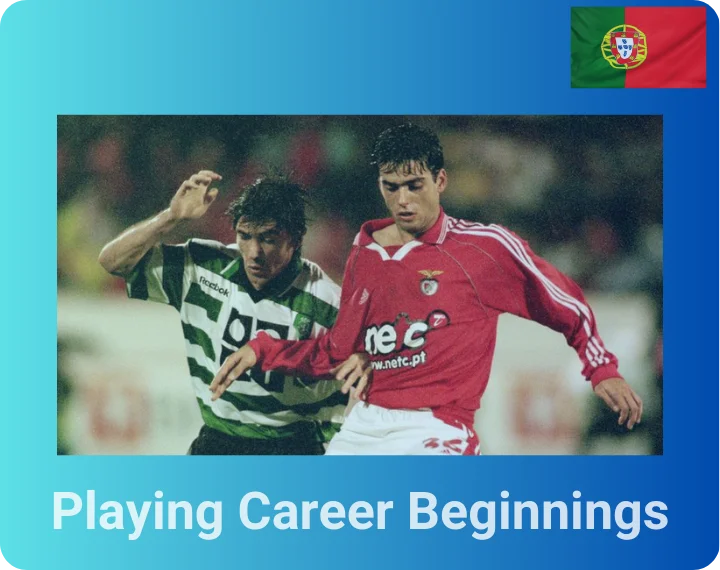
Influence on His Managerial Philosophy
Even though José Mourinho wasn’t a particularly successful player, his playing career had a significant influence on how his management approach evolved. He was able to gain a thorough understanding of football tactics throughout his stint in the lower leagues. Later on, his managerial style would be characterized by this realization.
Mourinho’s ability to read the game from a tactical standpoint, even as a player, gave him an edge when he transitioned into management. His approach was never about relying on raw talent or physical attributes but rather on deep analysis, meticulous preparation, and adaptability. These qualities, which were formed during his playing days, would go on to define his coaching career and lead to remarkable success at clubs like Chelsea, Inter Milan, Real Madrid, and Manchester United.
José Mourinho’s playing career may not have been the stuff of legends, but it played a crucial role in shaping the successful manager he became. The lessons learned during his time as a player in Portugal’s lower leagues laid the groundwork for his future accomplishments and set the stage for him to become one of the most innovative and successful managers in football history.
| José Mourinho’s Playing Career Highlights | Details |
| Early Life | Born in Setúbal, Portugal, 1963, with a football-influenced upbringing. |
| Position | Midfielder |
| Key Clubs | Belenenses, Rio Ave |
| Notable Achievements | Limited, played in Portugal’s lower leagues |
| Legacy | Developed a deep tactical understanding of football, which influenced his managerial career. |
In conclusion, while José Mourinho’s playing career didn’t bring him global recognition or fame, it was instrumental in the development of his tactical philosophy and leadership qualities. The lessons learned in those formative years set the stage for his future as one of football’s most accomplished and respected managers.
Youth Career and Early Aspirations
José Mourinho joined local youth teams in his hometown of Setúbal, Portugal, where he started his football career. It was evident at a young age that Mourinho was more than just a gifted football player. He was different from his colleagues because of his high football IQ. Mourinho placed more emphasis on reading the game, predicting plays, and strategically positioning himself than many young players who were more concerned with muscle or speed. His managerial attitude would eventually be heavily influenced by these early indications of tactical understanding.
Mourinho rose through the ranks of Portuguese football thanks to his grasp of football tactics. His ability to perceive and comprehend the wider picture on the field made him stand out, and his style was intellectual. Even with these early indications of genius, Mourinho’s playing career did not progress as quickly as many of his peers. He played for teams like Belenenses and Rio Ave during his career, which was mostly in the lower categories of Portuguese football.
Even though he wasn’t a very notable player in terms of recognition or awards, Mourinho stood out in the game because of his emphasis on the cerebral aspects of football. While some could have depended on physical strength, Mourinho’s success as a player was based on his strategy-based approach to the game.

José Mourinho’s Playing Career Highlights
- Youth Teams: Started at local youth clubs in Setúbal.
- Playing Style: Tactical awareness, intelligent positioning, and anticipation.
- Key Clubs: Belenenses, Rio Ave.
- Legacy: Developed a strong understanding of football tactics that would later shape his managerial career.
Short Stints with Portuguese Clubs
Rio Ave, Belenenses, and Sesimbra were among the teams where Mourinho played as a central midfielder. Even though Mourinho possessed the necessary abilities, his playing career was brief and underwhelming in terms of club honors. On the field, he was distinguished by his brains and tactical awareness more than his speed or physicality. Being in the right location at the right time and directing play from the midfield, he had a better understanding of the game’s flow than most. At the highest level, he was not as physically imposing as some of his peers, but his ability to read the game made him stand out.
Transition Away from Professional Playing
José Mourinho’s choice to stop playing professionally marked a sea change in his life. Although his playing career in the lower divisions of Portuguese football was not filled with many notable achievements, they had a pivotal role in shaping his destiny. Unlike many of his buddies who would go on to play at higher levels, Mourinho quickly found that football management was his true calling. His special knowledge of the game, acquired during his time on the field, would be the foundation of his success as a manager.
As his playing career developed, Mourinho realized that coaching was a better fit for him than playing on. He knew that his average physical characteristics might prevent him from competing at the highest levels of the sport. He stood out, however, because of his brilliance, footballing intuition, and in-depth tactical knowledge. Mourinho deliberately chose coaching over playing football in order to concentrate on teaching, where he could use his football knowledge on a far grander scale.
His choice to stop playing was a gradual one rather than a sudden one. Mourinho devoted time to studying the game, picking the brains of elite coaches, and acquiring important knowledge about the organization and management of teams. His transition from player to manager was a turning point in his career since it gave him the opportunity to follow the road that would ultimately make him one of the most prosperous and well-known football managers in the world.

Transition from Player to Manager: Key Moments
- Realization of Managerial Potential: Recognized that his future in football would lie in coaching.
- Studying the Game: Spent time analyzing tactics, observing other managers, and developing his understanding of team dynamics.
- Focus on Coaching: Chose to leave behind his playing career and pursue coaching opportunities in Portuguese football.
- First Coaching Role: Took on roles that allowed him to start his managerial career, including working as an assistant coach.
| José Mourinho’s Transition Away from Playing | Details |
| Realization | Mourinho recognized that his future was in coaching, not playing. |
| Tactical Focus | Shifted focus from playing to understanding and mastering football tactics. |
| Coaching Roles | Took up assistant coaching roles to gain experience. |
| Career Path | Transitioned to managing top clubs, utilizing his tactical knowledge and leadership abilities. |
The foundation for José Mourinho’s incredible managing career was laid by his decision to transition from professional playing to coaching. His mastery of tactics and the strategic aspect of the game, in particular, which he developed throughout his playing days, served as the foundation for his subsequent achievements. His playing career certainly set the groundwork for the exceptional manager he would become, even though it may not have been full of international success. Through this change, Mourinho reached the highest level of football management and illustrated the value of identifying one’s skills and following a career path that plays to them.
Realization of Limitations at the Top Level
Even with his keen tactical awareness, Mourinho’s physical limitations would prevent him from competing at the highest levels of professional football, he understood as his playing career developed. Eventually, unable to match the athleticism of some of the more physically gifted people, he quit playing. He was able to identify his true calling—coaching—thanks to this early realization.
Early Decision to Focus on Coaching and Analysis
Early in his career, Mourinho made a crucial choice rather than hanging around the professional football scene as a player with little opportunities. He realized that coaching was more his forte than playing. His keen grasp of the tactical aspects of the game led him to focus on teaching and football analysis. In order to better understand the theoretical facets of the sport and to develop his managerial style, Mourinho quickly started taking coaching classes.
Studying Sports Science and Attending Coaching Courses
Mourinho studied sports science since he was dedicated to his coaching vocation. He studied how to assess and analyze player performance and tactical setups while enrolled in coaching courses. His education broadened his perspective on working with professional sportsmen and enhanced his comprehension of the game. His emphasis on player psychology, tactical analysis, and game management were his coaching hallmarks, and this foundation served as the springboard for his subsequent success.
Legacy of His Playing Days
José Mourinho’s playing career, though not filled with remarkable personal achievements or extensive international recognition, laid the groundwork for his legendary managerial career. His time on the field, primarily in Portugal’s lower leagues, played a significant role in shaping the tactical genius and leadership qualities that he would later use to dominate the footballing world as a manager. Despite not being a star player, Mourinho’s playing days left an indelible mark on his future approach to the game.
Despite having little success as a player, Mourinho gained vital expertise in football tactics and team chemistry during his playing career. The basis for his subsequent success as a manager was established by his ability to read the game, predict plays, and strategically position himself on the field. As a player, Mourinho developed his constant attention to the tactical elements of the game, which helped him better grasp how to form, lead, and inspire teams.
The most important lesson he learned from his playing days was that football intelligence, not physical power, was his genuine strength. His managerial approach, which was marked by careful planning, analysis, and strategic adaptability, would be built around this realization. In the end, his early experiences playing in the lesser leagues gave him the abilities he needed to manage some of the best football teams in the world.
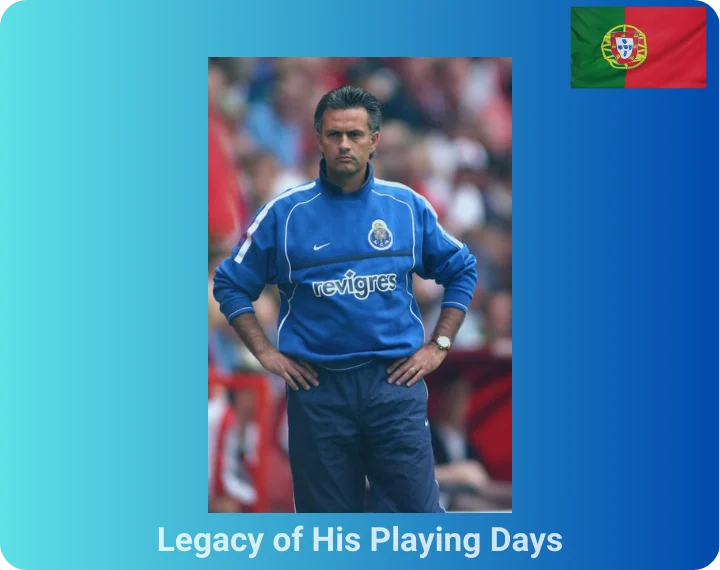
Legacy of His Playing Career
- Tactical Mindset: Developed a strong understanding of football tactics that shaped his managerial approach.
- Leadership Qualities: Learned the importance of team cohesion and discipline.
- Strategic Awareness: Gained deep insights into how to manage and analyze teams, which influenced his future coaching methods.
| José Mourinho’s Playing Career Legacy | Details |
| Tactical Insights | Gained a deep understanding of football tactics during his playing days. |
| Leadership | Developed key leadership skills that would later influence his managerial success. |
| Strategic Foundation | Built a solid foundation for strategic thinking, which became the hallmark of his managerial career. |
José Mourinho’s playing days may not have been spectacular in terms of achievements, but they were instrumental in shaping the manager he became. The lessons he learned from his time on the field contributed greatly to his unique managerial philosophy, where tactical awareness, leadership, and strategic planning played vital roles in his success.
How His Playing Experience Shaped His Managerial Style
Although humble, José Mourinho’s playing career had a lasting impact on his management style. He has a unique understanding of football players’ mindsets according to his playing career. Having a player’s viewpoint on the game enabled him to manage his teams with intelligence and empathy because he was aware of the difficulties that players encountered on the field. Being a central midfielder also shaped Mourinho’s tactical philosophy since he understood how crucial structure, balance, and flexibility were to creating a winning squad.
Emphasis on Strategy, Discipline, and Preparation
The playing career of Mourinho had a significant impact on his managing style. He incorporated his lifelong concentration on reading the game and making wise choices into his teaching techniques. He gained notoriety for his extremely methodical and disciplined style of play. A key component of Mourinho’s philosophy was match preparation, with a keen eye for tactical specifics and squad structure. His strategic approach laid the foundation for his success as a coach and made his teams extremely difficult to dismantle.
Appreciation for Players’ Perspectives on the Pitch
Mourinho’s ability to relate to players and comprehend their experiences on the field has been one of his main managerial assets. He understood the emotional and mental difficulties players encounter in high-stakes games based on his own playing history. He was able to efficiently manage teams thanks to his sympathetic style, which made sure that players were encouraged to realize their full potential. One of the main reasons for his success was his player-centric management approach.
Comparison to Other Managers with Modest Playing Careers
It is not exceptional for José Mourinho to go from a lowly playing career to become one of the most successful football managers in the world. Even if a number of other extremely successful football managers had less than stellar playing careers, their managerial skills have cemented their status as game legends. These players and Mourinho’s journey are frequently compared since they both had an early realization that management, not playing, was their destiny.
While many famous football managers were former world-class players, there are several notable examples of coaches who excelled despite limited playing careers. These managers, like Mourinho, showcased the importance of football intelligence, leadership, and tactical understanding, rather than relying solely on physical abilities or individual talent.
Arsène Wenger, for instance, is another legendary personality in football management, yet his playing career did not achieve the same success as many of his peers. He was not well-known for any significant accomplishments, despite playing for French teams like RC Strasbourg and AS Mutzig. But especially at Arsenal, Wenger’s strategic thinking and acute sense of tactical creativity allowed him to transform English football.
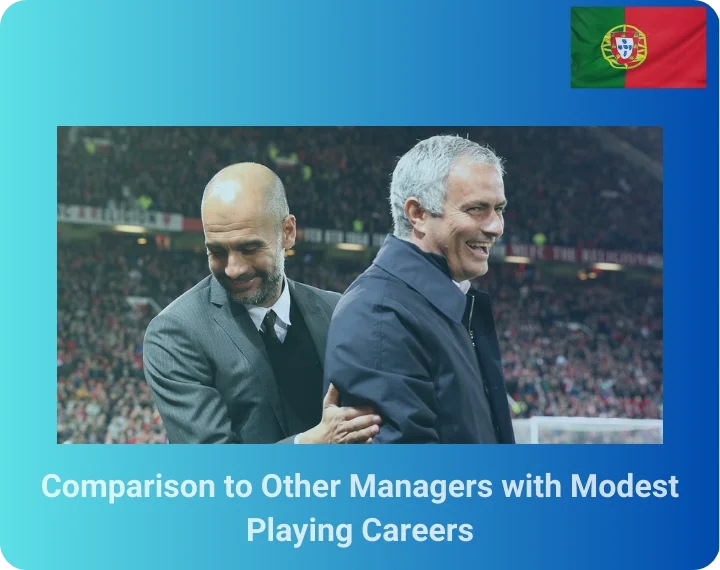
Similarly, Sir Alex Ferguson, regarded as one of the greatest football managers of all time, had a playing career that was far from remarkable. He played for clubs such as Queen’s Park and St. Johnstone, but his playing career did not see him achieve international stardom. Instead, Ferguson’s success came from his leadership skills, his ability to motivate players, and his tactical insights, all of which were honed through his experiences both as a player and a manager.
Mourinho, like these managers, had a playing career that laid the groundwork for his future success. His understanding of football tactics, his leadership abilities, and his strategic thinking were key factors in his managerial rise, despite not being a star player.
| Manager | Playing Career | Managerial Success |
| José Mourinho | Played in Portugal’s lower divisions (e.g., Belenenses, Rio Ave) | Known for tactical brilliance, success with Chelsea, Real Madrid, and more |
| Arsène Wenger | Played for AS Mutzig, RC Strasbourg | Revolutionized English football with Arsenal, known for long-term success |
| Sir Alex Ferguson | Played for Queen’s Park, St. Johnstone | Dominated Scottish football, later made Manchester United a global powerhouse |
In conclusion, José Mourinho’s journey from a modest playing career to becoming one of football’s most successful managers mirrors that of other prominent figures in the sport. Their shared focus on intelligence, leadership, and strategic thinking allowed them to reach the pinnacle of managerial success, despite not having extraordinary playing careers.
Rise of the “Tactical Coach” Era
Even though Mourinho’s playing career was not as distinguished, his move from player to coach is part of a larger trend in football where tactical thinkers have gained popularity. excellent players used to frequently become excellent coaches, but in recent years, a new type of manager has emerged: those with exceptional tactical understanding who may not have had stellar playing careers. Together with other well-known individuals like Pep Guardiola, Arsène Wenger, and Jurgen Klopp, Mourinho exemplifies this new breed of coaches who have demonstrated that football IQ can triumph over fame and physicality.
Mourinho’s Journey as an Example of Football IQ Over Fame
As demonstrated by Mourinho’s ascent from a substandard playing career to become one of the most successful and well-respected football managers in the world, football IQ can frequently outstrip the need for a fantastic playing career. His achievement has helped a lot of people who may not have had a great playing career but have a deep understanding of the game. The ability to assess, adjust, and motivate is more important for football success than fame or innate skill. Mourinho’s leadership, tactical acumen, and unwavering drive for success served as the cornerstones of his career.
